IMX 2024 Day 1 Recap
Location: PUSH Art Center, Shanghai
Published on: October 24, 2024
The first day of IMX 2024 offered a range of engaging discussions, insightful panels, and standout performances. Here’s a summary of the day’s highlights.
Opening Ceremony: A Look to the Future
The event kicked off with an inspiring opening ceremony hosted by Qiang Yin, Deputy Director of the Shanghai Municipal Cultural Creative Office. He spoke about Shanghai’s pivotal role in fostering cultural exchange through events like IMX, highlighting how the city integrates international vision with cultural innovation. His remarks emphasized Shanghai’s cultural economy, which contributes over 13% to the city’s GDP, even amid post-pandemic recovery.
Following this, Zou Xiaoman, Co-Founder and COO of Kanjian Music, shared insights into the transformative power of music in bridging cultures, reflecting on IMX’s evolution since 2020. She described the festival as a unique platform that gathers international music brands, labels, and creators to exchange ideas and explore new possibilities. The vision for this year’s festival focuses on integrating cultural exchanges, industry insights, and innovations in music and technology.
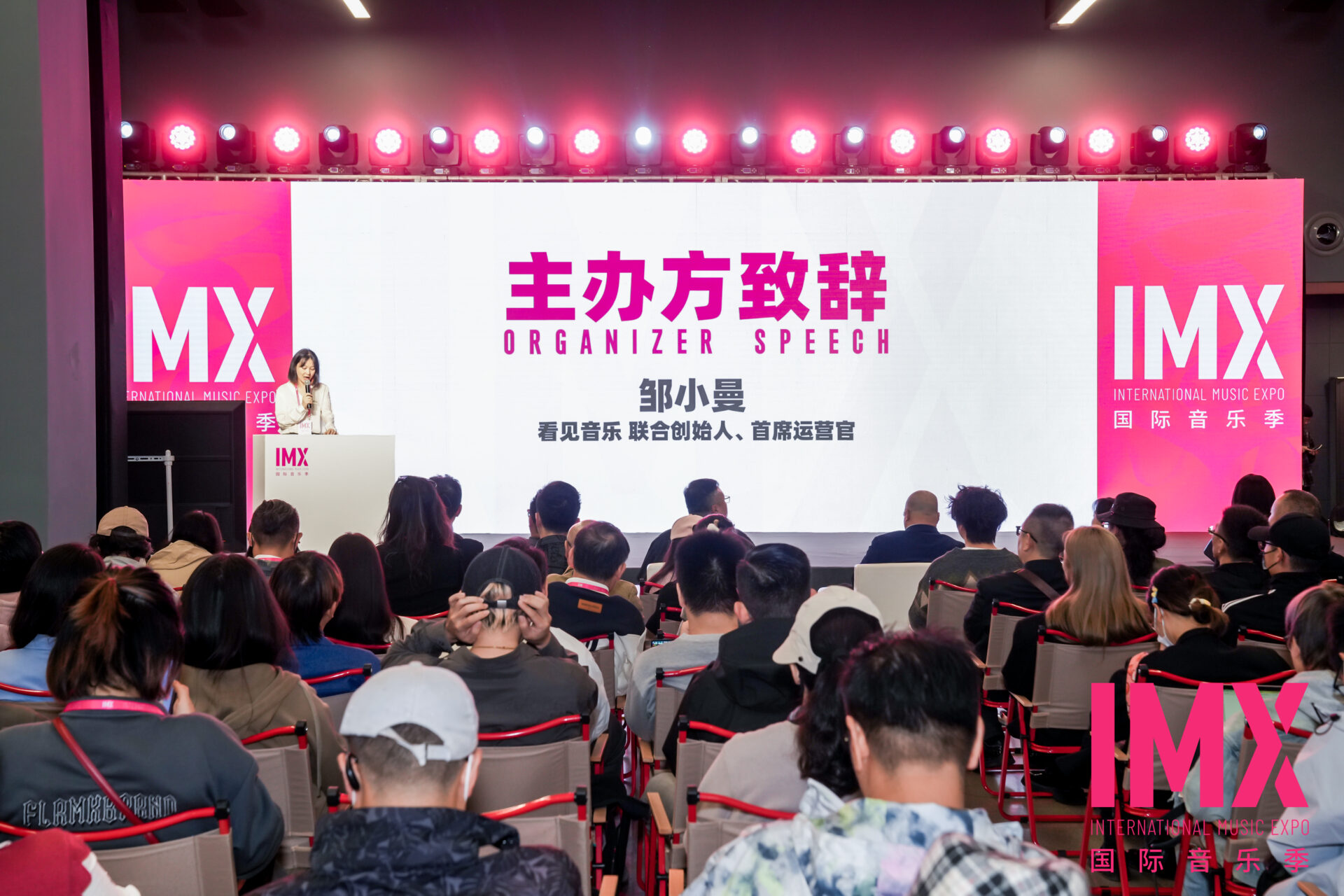
Conference Sessions: Thought Leadership and Industry Insights
Throughout the day, the IMX Conference tackled the most exciting trends and challenges in the music industry, particularly in technology and AI.
Modernizing Ancient Scores – Digital Innovation in the Chinese Traditional Music Industry
Presenter: Zhang Mengshi, Assistant Director, Shanghai Music Publishing House
Zhang Mengshi delivered a fascinating presentation on how digital technologies are revolutionizing the preservation and dissemination of ancient Chinese music scores. Her project, Gu Pu Jingyi, focuses on digitizing traditional notation systems, such as simplified character notation, and creating standardized fonts for easier access. This initiative opens the door for new audiences to explore the depth of ancient Chinese music while preserving its integrity for future generations.
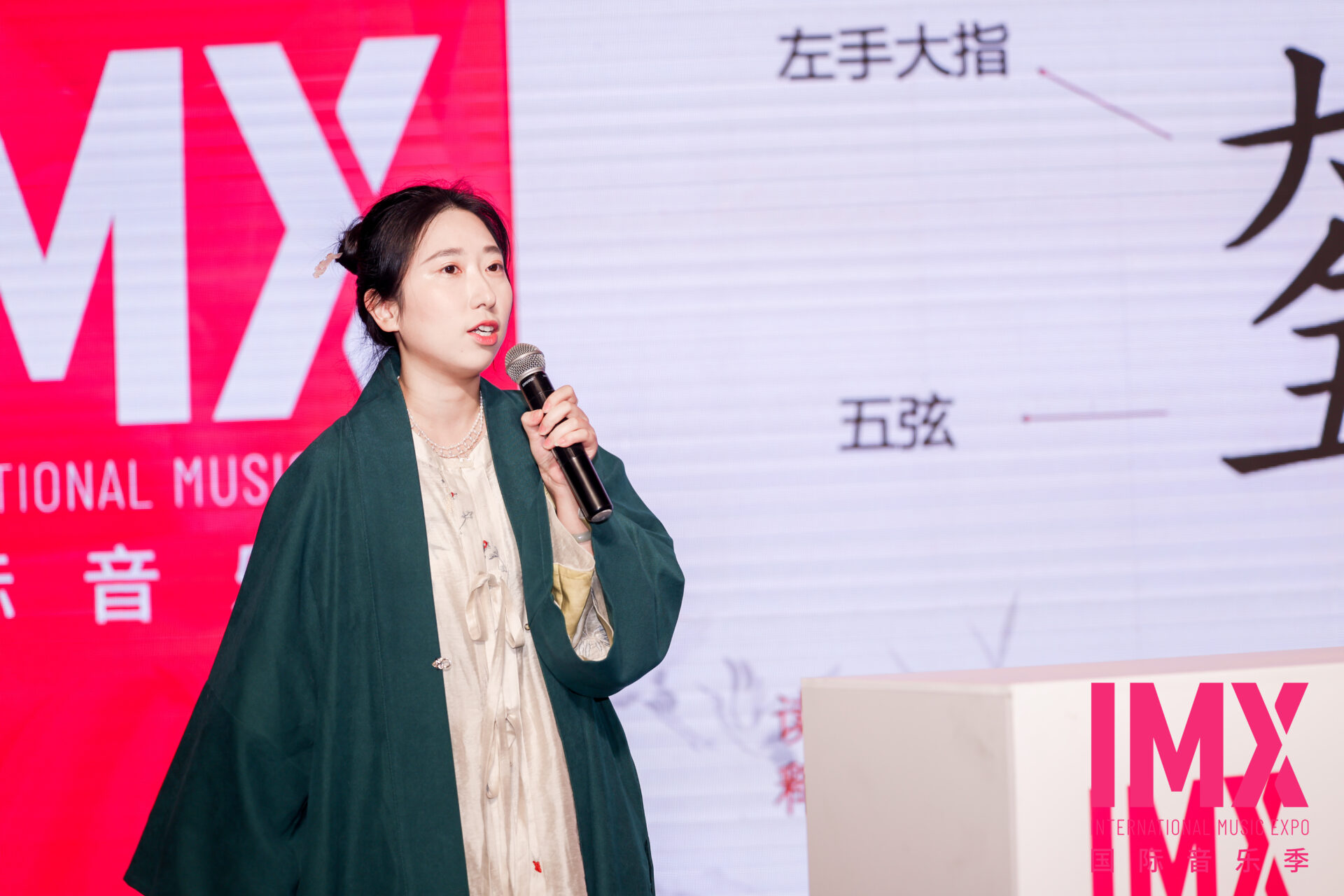
Traditional Music and World Music – Boundaries, Fusion, and the Future
Host: Hu Xiaowei
Panelists: Rui Wenbin (Shanghai Starsing), Li Jie (Homeland), Alan Duan (Shanghai Music Publishing House)
In a rich discussion led by Hu Xiaowei, this panel explored the delicate balance between preserving traditional music and embracing its fusion with world music. Rui Wenbin spoke about his efforts in recording and distributing music from China’s ethnic minorities, highlighting the importance of maintaining authenticity while reaching global audiences. Li Jie shared heartfelt stories about his Homeland Project, which unites young musicians from diverse backgrounds to safeguard and reinterpret ancient tunes. Alan Duan added insights from a publishing perspective, emphasizing the challenges of bringing Chinese traditional music to the international stage. Together, the panelists painted a picture of how tradition can coexist with innovation in the ever-evolving global music landscape.
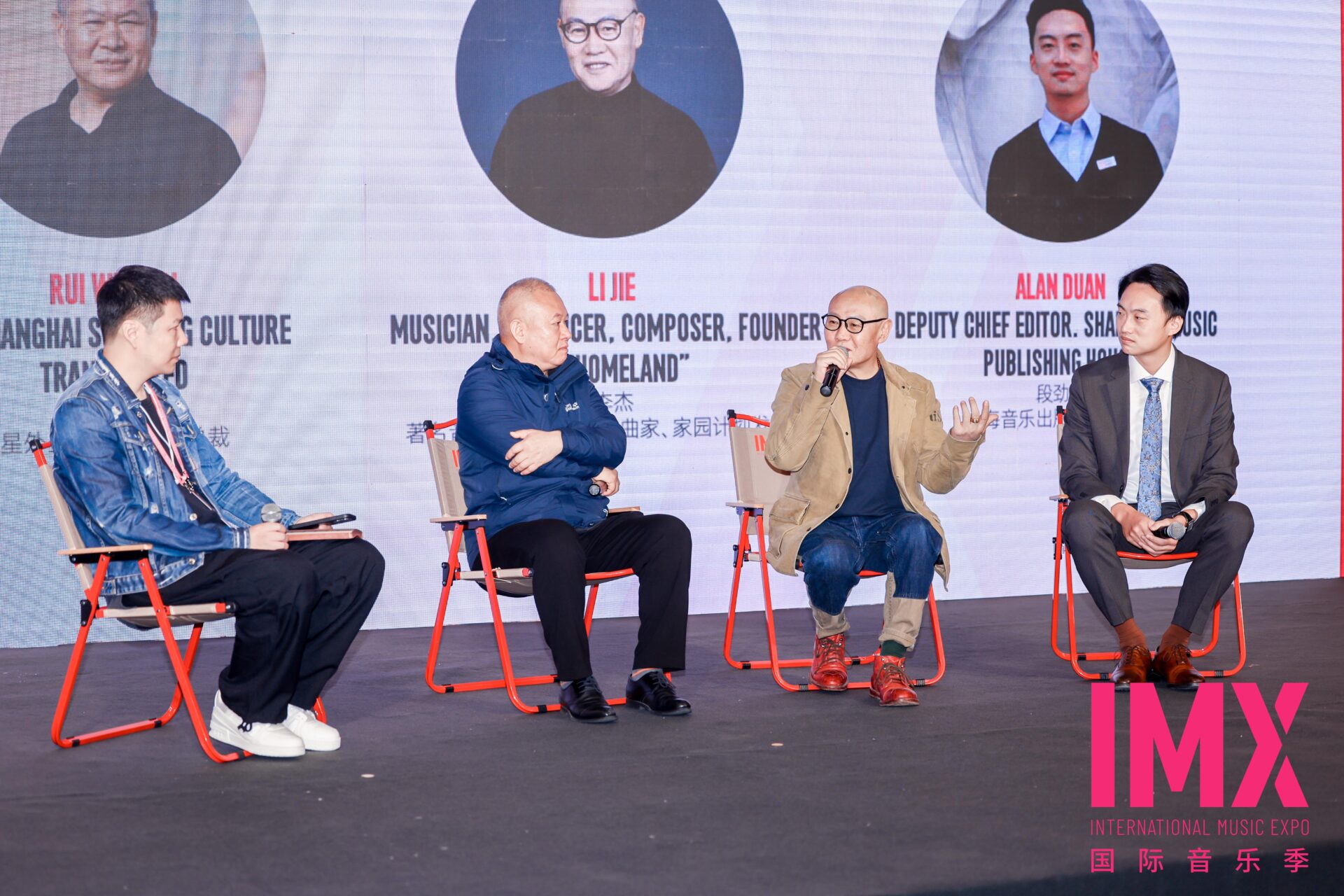
Trends and Outlook for Intelligent Cabin Sound Experience
Presenter: Neil Nie, Head of NIO Sonic Experience Team
Neil Nie captivated the audience with insights on the future of in-car audio experiences. As modern cabins evolve into personal entertainment spaces, he explained how NIO’s team is using advanced audio technology, such as spatial sound and immersive audio, to enhance users’ daily commutes. He predicted a shift from traditional stereo systems to personalized, immersive soundscapes tailored to each driver’s preferences.
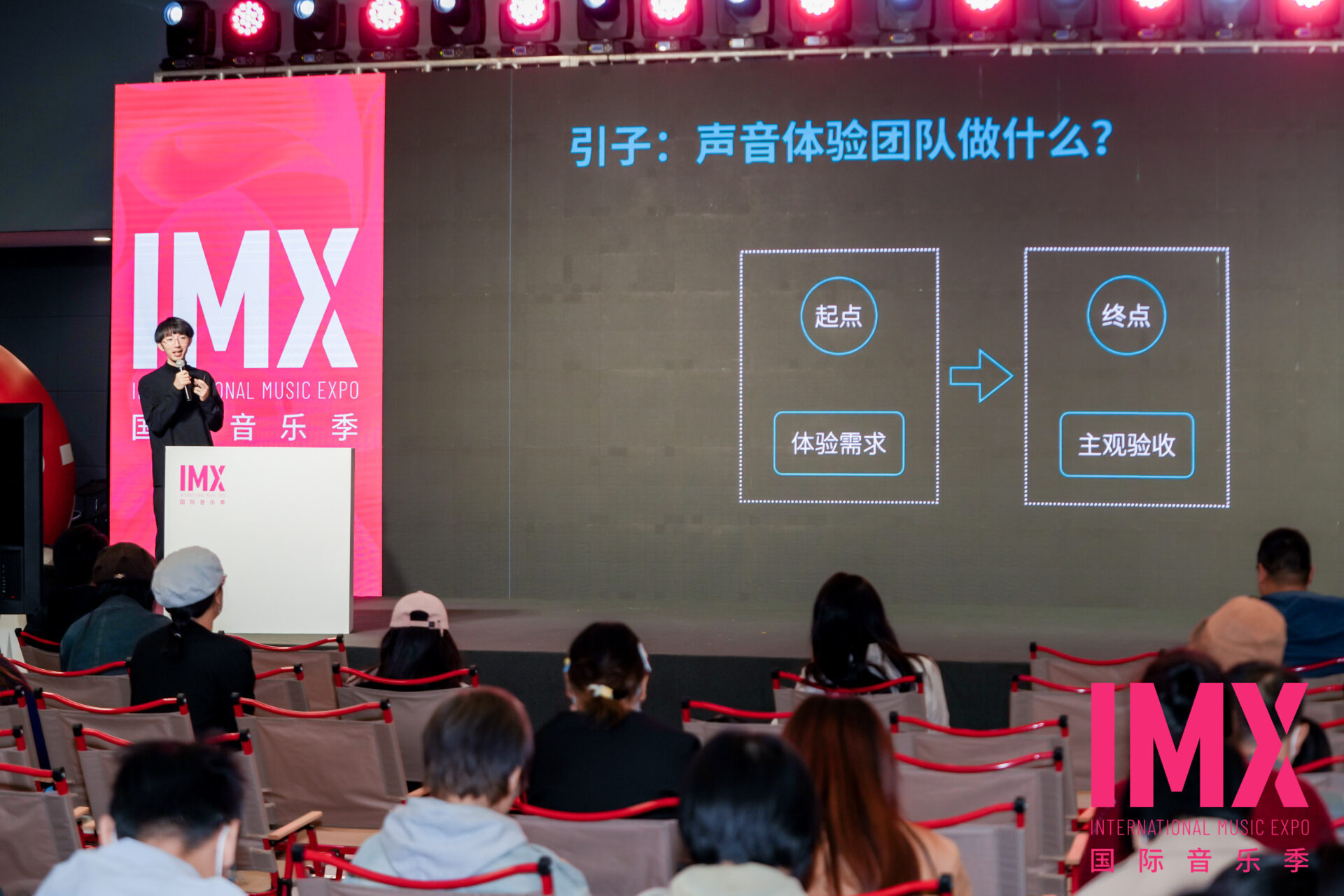
The Future of Streaming—Trends in Personalized Recommendations, Audio Quality Enhancement, and User Experience
Host: Hu Xiaowei
Panelists: Jeffrey Chiang (Director, Fluxus/Board Member, Merlin), Max Thomas (Label Manager APAC, Secretly Group)
The discussion on the future of streaming explored how personalized recommendations and evolving user experiences are reshaping the music landscape. Jeffrey Chiang emphasized the importance of leveraging data from DSPs (Digital Service Providers) to navigate global expansion, particularly for non-English content like Korean music. Max Thomas echoed this, discussing how adapting content for local markets in Asia is crucial for international artists. Both panelists stressed that real-time data provides valuable insights, but success in new regions often comes from being responsive to unexpected opportunities, such as viral trends.
The panel also touched on the future of audio quality enhancements, with Thomas noting the growing influence of immersive formats like Dolby Atmos in markets like the U.S. However, Chiang highlighted that streaming success now requires engaging audiences on multiple levels, from playlists to visual elements like live streams and music videos. As algorithms increasingly track user behaviors across platforms, personalized recommendations will play a larger role in helping artists convert casual listeners into dedicated fans.

How Technology is Reshaping Music Asset Management
Host: Brendan Gaffney – Business Development, Music Ally Japan
Panelists: Akira Nomoto – Executive Officer, Faith Inc., Golan Aharony – Director of Repertoire & Partnerships, Revelator Ltd., Tinko Georgiev – VP, Kanjian / Daflow
The panel on reshaping music asset management through technology provided deep insights into the evolving challenges and opportunities faced by the industry today.
Akira Nomoto from Faith Inc. highlighted the challenges unique to the Japanese music industry, focusing on the difficulties of cleaning up metadata from decades-old music catalogs. He emphasized the sheer scale of the task, noting that Japan’s rich musical history, stretching back over 100 years, means that older tracks have “super dirty” metadata, making it hard to properly digitize and monetize them. “We’re still figuring out how to clean up a century’s worth of data, and it’s a massive challenge,” said Nomoto, stressing the critical need to integrate metadata from older catalogs with modern distribution systems.
Golan Aharony of Revelator Ltd. emphasized the importance of metadata management for the future of digital distribution. He acknowledged that while distribution companies have made significant strides in offering artists and labels more control over their digital assets, there are still considerable gaps, especially in rights management. Aharony pointed out that new AI tools are helping companies like Revelator “tag and sort catalogs more accurately than ever before,” a key advancement in ensuring accurate rights tracking and maximizing revenue potential for artists.
Tinko Georgiev echoed these sentiments, bringing the conversation to China’s unique landscape, where he highlighted a stark contrast in digital rights management. According to Georgiev, “in China, we don’t have robust tools for digital asset management like in the West.” Instead, local artists and labels often use basic cloud services like Baidu or Ali Cloud for storage, which lacks metadata support and efficient search functionalities. This disjointed system leaves many rights holders struggling to manage and monetize their digital assets effectively. He also underscored the importance of Web 3.0 technologies like blockchain and smart contracts for the future, adding, “These technologies could be game-changers for the automation of music licensing.”
Key Takeaways:
- The global music industry is transitioning towards more sophisticated digital asset management systems, but regional differences, like those in China and Japan, pose unique challenges.
- AI and blockchain hold significant promise for automating licensing and ensuring proper rights management. However, human involvement, particularly in cleaning and verifying metadata, remains essential to this process.
- Consolidating rights and simplifying licensing agreements will be vital to maximizing future revenue streams.
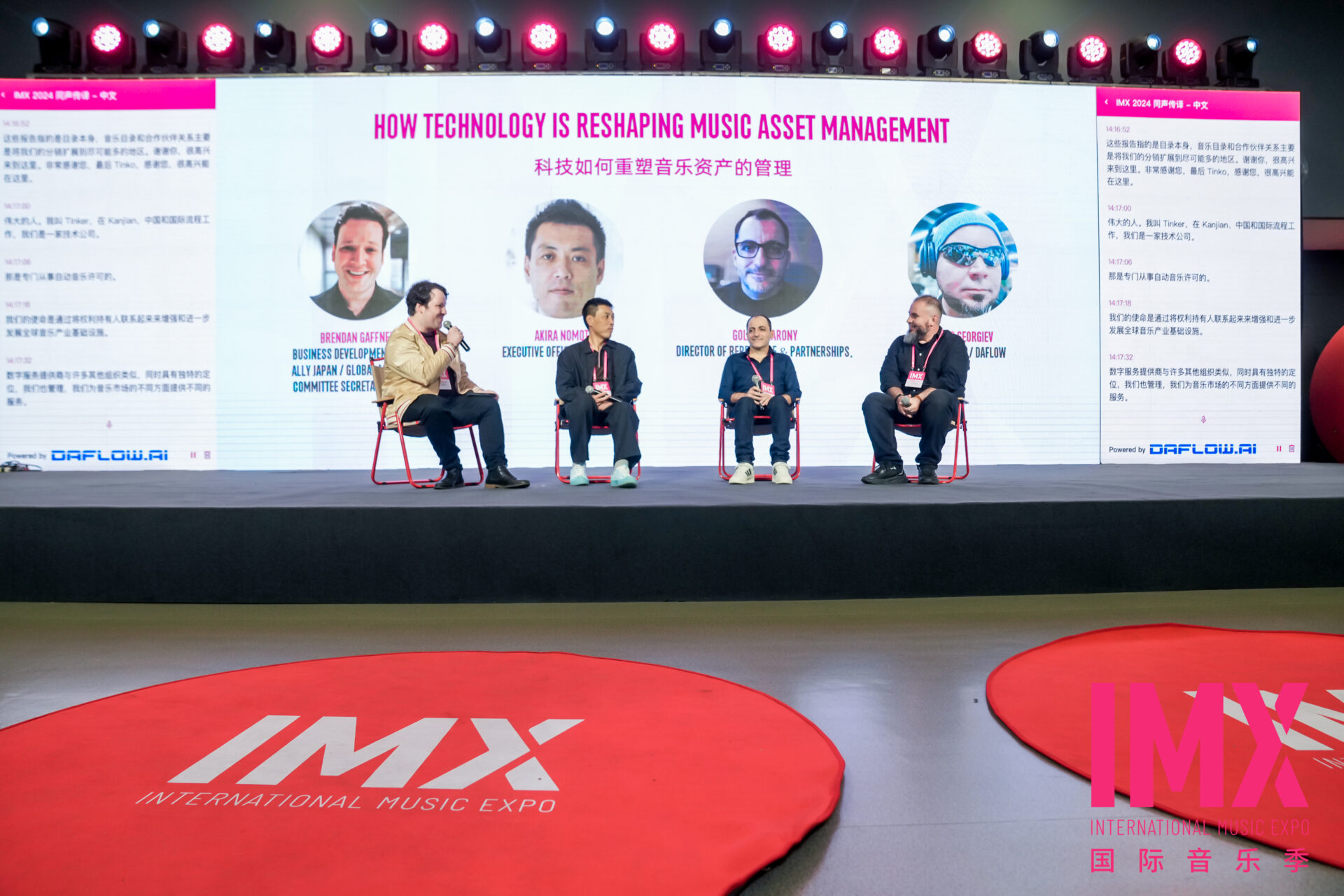
The Impact of AI on Analysis and Recommendation of Music Content
Host: Tinko Georgiev – VP, Kanjian / Daflow
Panelists: Joshua Weikert – CTO, Cyanite, Dmytro Lopushanskyy – CTO, Harmix, Andrew Du – President of WKZ Academy of Artificial Intelligence, Liwen Zhang – Founder of Banqu Tech
The panel delved into the transformative role of AI in music content analysis and recommendation systems, offering a forward-looking perspective on how machine learning is reshaping the discovery and curation of music.
Joshua Weikert, CTO of Cyanite, opened by explaining how AI now “listens to music like humans do,” breaking down complex audio patterns and turning them into data that can predict genres, moods, and instrumentation without traditional metadata. He described the process as creating a “language of music,” where AI can categorize songs based purely on sound, rather than relying on human-generated tags.
Dmytro Lopushanskyy of Harmix emphasized the critical role that well-curated data plays in building these advanced AI tools. “Without robust, unbiased datasets, the algorithms won’t perform as expected,” Lopushanskyy explained. He discussed the challenges of training AI models, particularly with ensuring they are fed diverse data from across cultures and genres. Harmix has been able to mitigate some of these challenges by incorporating user-generated content and licensed tracks to train their AI systems, which then map audio features to specific musical traits like genre or mood.
Andrew Du added a unique perspective by discussing the importance of understanding user behavior in AI recommendations. Drawing on his experience with Tencent’s streaming platforms, he highlighted how AI has evolved beyond simple “if-this-then-that” logic. “AI now looks at the user’s entire behavioral pattern, not just the songs they listen to, but their social interactions, playlists, and preferences,” he noted. This allows platforms to deliver hyper-personalized recommendations that go beyond genre or artist similarities.
Liwen Zhang brought the conversation back to practical applications, discussing how AI can assist in the creation and promotion of music. She shared a compelling example from her company’s work with AI-assisted music therapy, where AI was able to recommend specific music to help rehabilitate patients based on their emotional and psychological needs. Zhang pointed out, “AI can recommend music not just for entertainment, but also for therapeutic and personalized experiences.”
Key Takeaways:
- AI is revolutionizing the way we categorize, recommend, and even create music, offering more personalized user experiences.
- While AI offers sophisticated tools for music tagging and recommendation, the quality of these tools relies heavily on the breadth and depth of the training data.
- There is immense potential for AI to drive innovation in areas beyond entertainment, such as music therapy, and to break down cultural and genre-based barriers in music discovery.
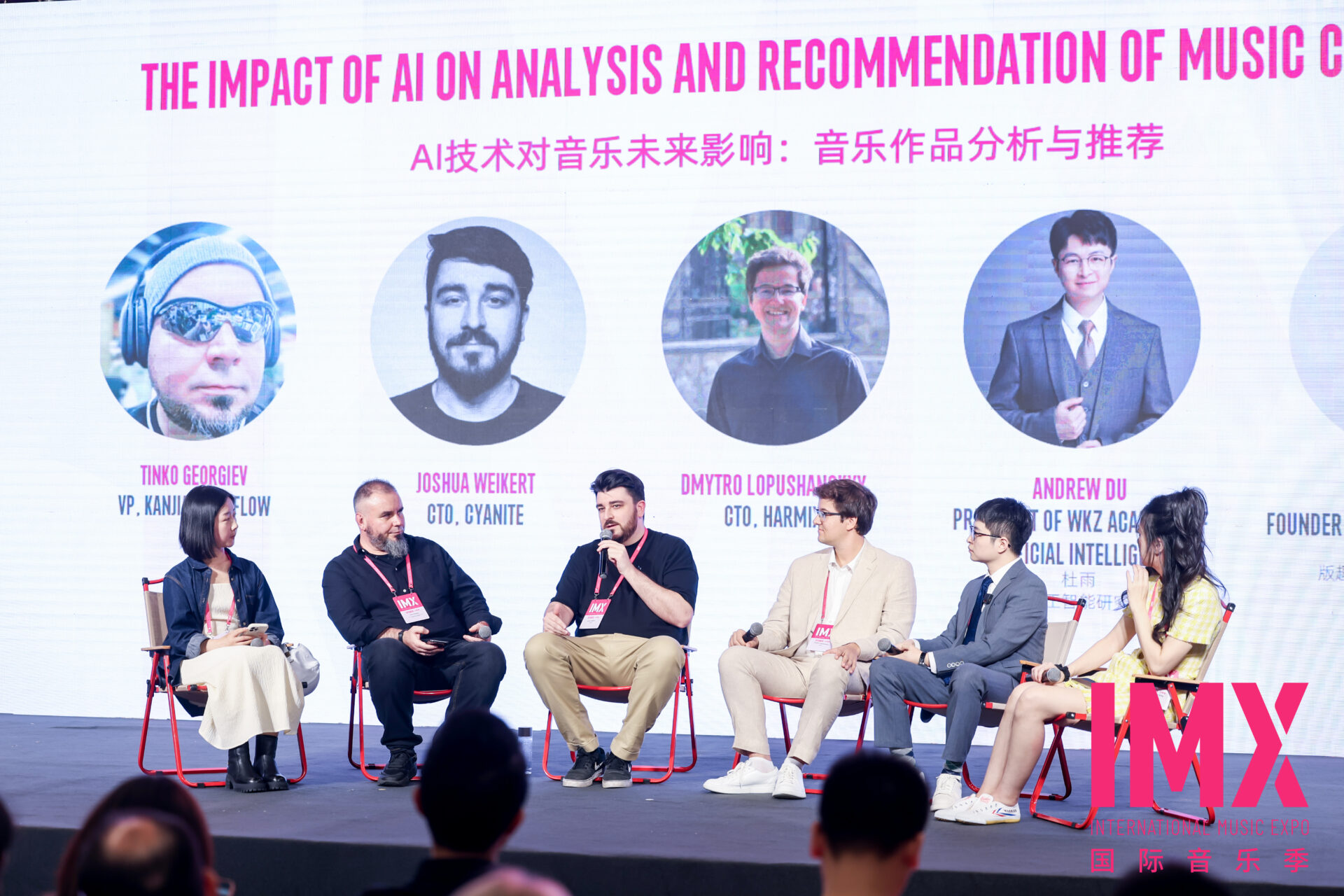
The Commercial Value of Original Music in the AI Era
Host: Hu XiaoWei
Panelists: Yin Yujie (Founder/CEO, Musverse), Nazar Ponochevnyi (CEO, Harmix), Glory Ma (Music Critic), Sooan Lee (President, Beyond Music IP Value Up)
This panel explored how AI is reshaping the commercial value of original music. Yin Yujie highlighted that AI serves as both a tool and an opportunity for artists, enabling new creative avenues. “AI isn’t here to replace musicians; it’s here to assist them in finding new paths,” he remarked. Nazar Ponochevnyi discussed the challenges AI faces in aiding undiscovered talents, emphasizing that “the issue isn’t about the volume of music but about how we can find the right music.” Glory Ma added depth to the conversation by stating, “AI can replicate timbre, but it can never capture the emotional state of an artist at a specific moment,” underscoring the irreplaceable human element in music creation. Sooan Lee spoke about leveraging AI to enhance IP value, noting that technology can help maximize the commercial potential of original works without compromising artistic integrity.
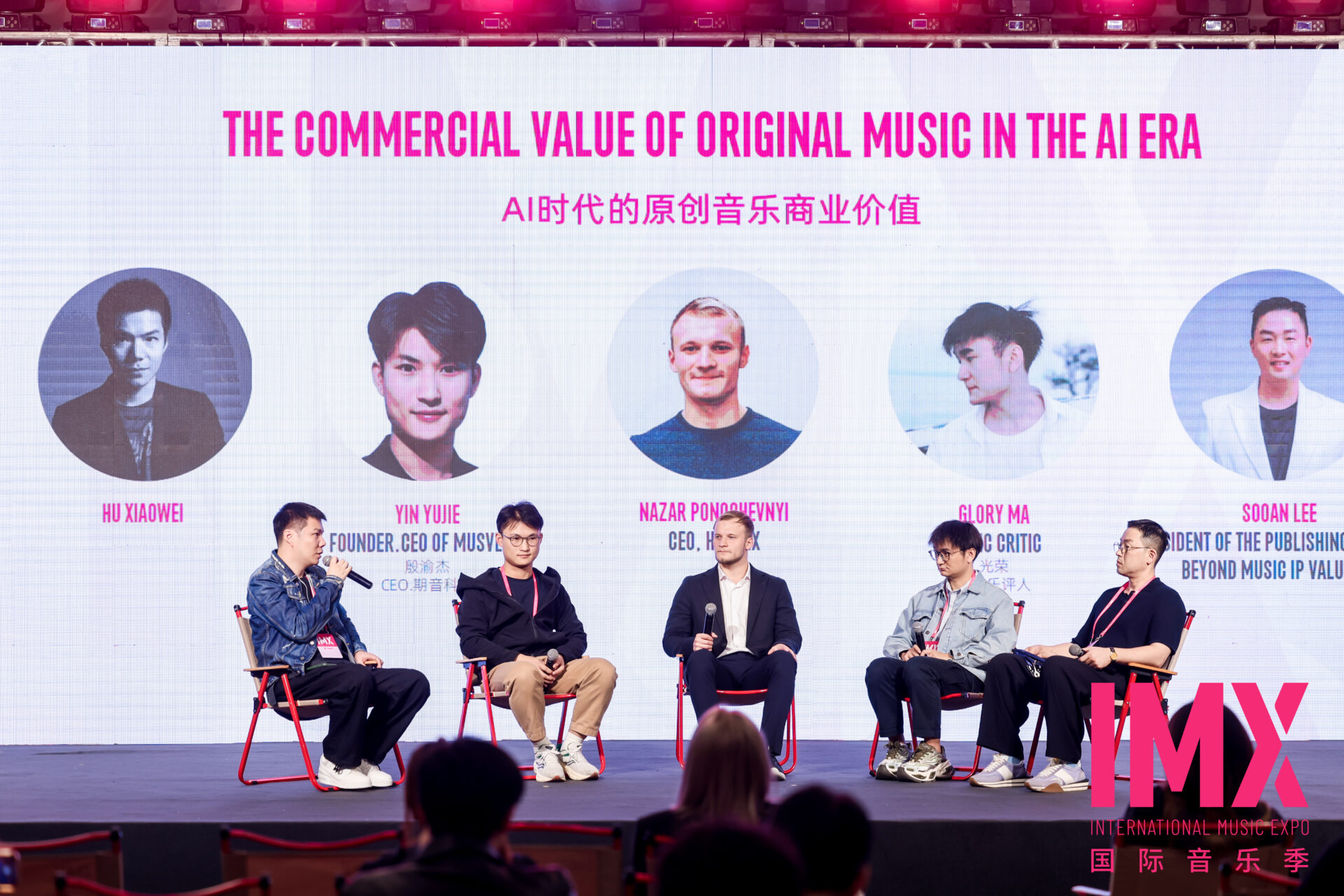
How Artist Support Programs Empower Emerging Musicians
Host: Luo Yi
Panelists: Young (Manager, ModernskyLab SH), Carol (VP, NetEase CloudMusic), CORSAK (Songwriter and Singer)
This session focused on the crucial role of artist support programs in nurturing new talent. Carol from NetEase CloudMusic highlighted their platform’s longstanding commitment to original musicians, mentioning initiatives like the “Stone Plan” launched in 2016. “Over the past 11 years, we’ve helped countless musicians find a platform and a voice,” she stated. CORSAK, a songwriter and singer, shared his personal journey navigating the music industry. He reflected on the challenges of gaining exposure and how support programs have been instrumental in his career. “It’s easy to feel lost in the sea of content, but initiatives like these create meaningful opportunities for growth,” he noted. Young emphasized the importance of live performance opportunities for emerging artists. “Giving new talent a stage is essential for their growth and survival in a competitive market,” he said, discussing how venues like ModernskyLab provide platforms for artists to connect with audiences and hone their craft.
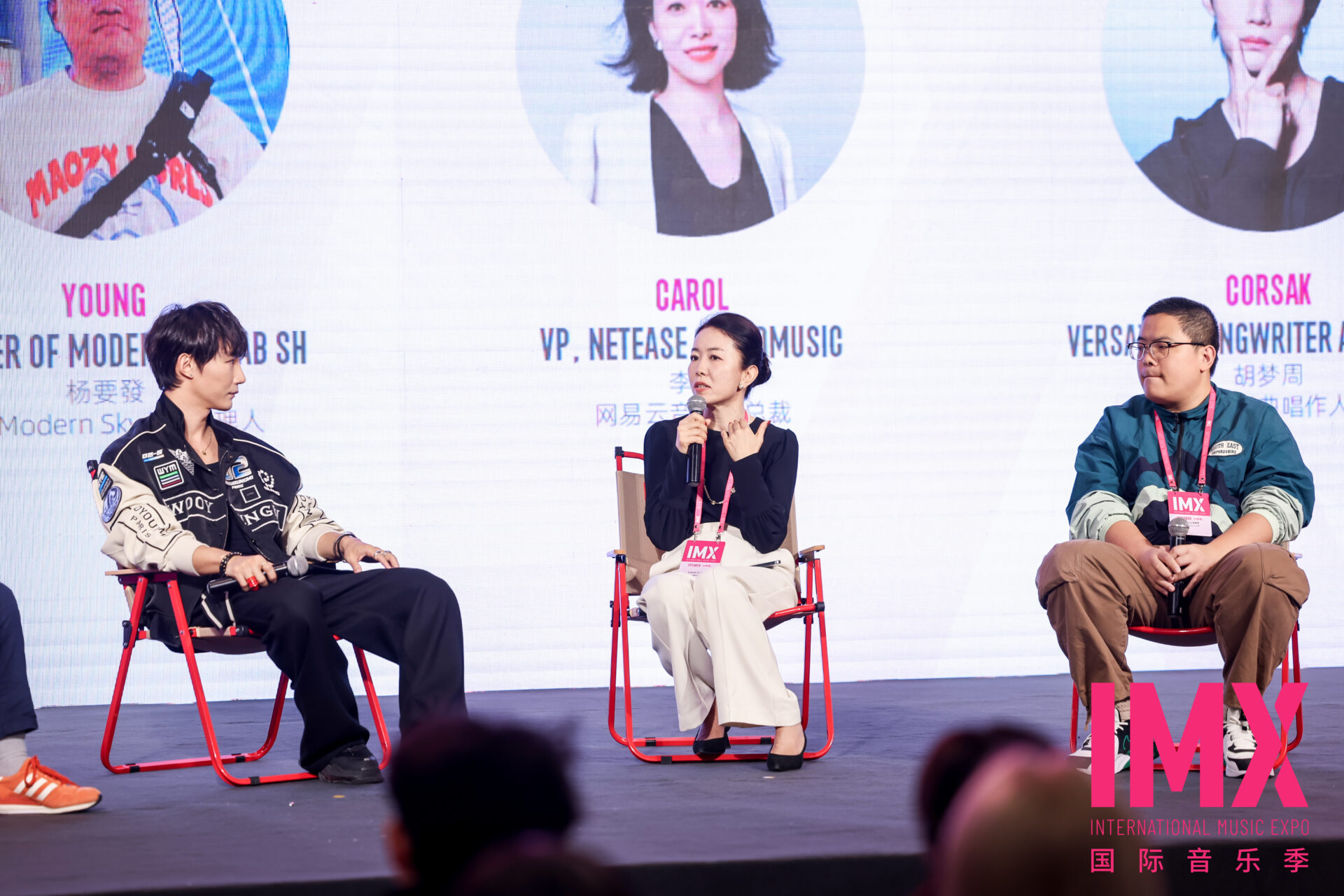
Showcase & Live Performances: A Night of Talent
On October 24th, the IMX Showcase & Live segment provided a vibrant and eclectic mix of performances. The New Waves showcase at 12:30 PM on the IMX Live Stage featured emerging talents, injecting fresh energy into the event. Later, the Chill Time session at 2:00 PM offered a more intimate atmosphere with open mic performances. The day concluded with the highly anticipated MODERN SKY LAB Showcase at 7:30 PM, featuring top artists from one of China’s leading music labels, leaving the audience buzzing with excitement.
Looking Forward to Day 2
Day 2 of IMX 2024 offers a rich program of insightful discussions, expert-led workshops, and dynamic performances. Attendees will delve into key trends shaping the future of music, from exploring the state of the U.S. music industry to analyzing AI-generated copyright ownership. With panels on monetization, music infringement, and royalties, and showcases by emerging artists like Jack Wang and Yuulili, the day is set to engage and inspire. Don’t miss the electrifying performances on the IMX Live Stage to conclude the day!

